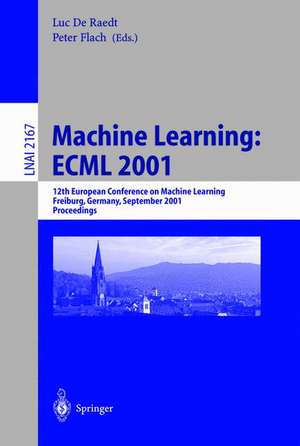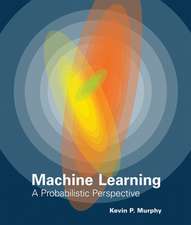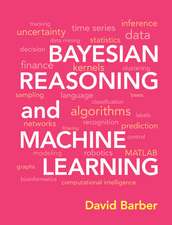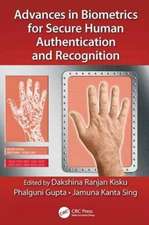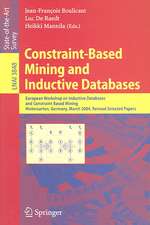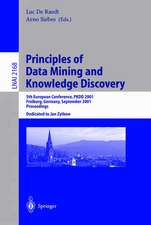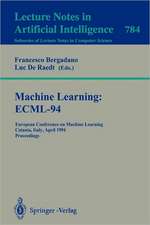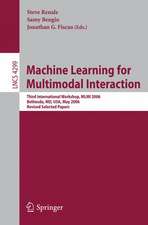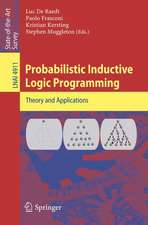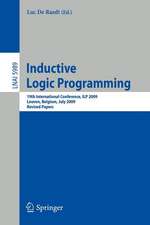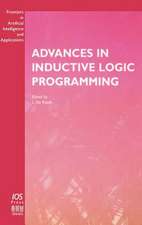Machine Learning: ECML 2001: 12th European Conference on Machine Learning, Freiburg, Germany, September 5-7, 2001. Proceedings: Lecture Notes in Computer Science, cartea 2167
Editat de Luc de Raedt, Peter Flachen Limba Engleză Paperback – 23 aug 2001
The 50 revised full papers presented together with four invited contributions were carefully reviewed and selected from a total of 140 submissions. Among the topics covered are classifier systems, naive-Bayes classification, rule learning, decision tree-based classification, Web mining, equation discovery, inductive logic programming, text categorization, agent learning, backpropagation, reinforcement learning, sequence prediction, sequential decisions, classification learning, sampling, and semi-supervised learning.
Din seria Lecture Notes in Computer Science
- 20%
 Preț: 1061.55 lei
Preț: 1061.55 lei - 20%
 Preț: 307.71 lei
Preț: 307.71 lei - 20%
 Preț: 438.69 lei
Preț: 438.69 lei - 20%
 Preț: 579.30 lei
Preț: 579.30 lei -
 Preț: 410.88 lei
Preț: 410.88 lei - 17%
 Preț: 427.22 lei
Preț: 427.22 lei - 20%
 Preț: 596.46 lei
Preț: 596.46 lei - 15%
 Preț: 448.04 lei
Preț: 448.04 lei - 20%
 Preț: 353.50 lei
Preț: 353.50 lei -
 Preț: 389.49 lei
Preț: 389.49 lei - 20%
 Preț: 309.90 lei
Preț: 309.90 lei - 20%
 Preț: 645.28 lei
Preț: 645.28 lei - 20%
 Preț: 763.23 lei
Preț: 763.23 lei - 15%
 Preț: 580.46 lei
Preț: 580.46 lei - 20%
 Preț: 310.28 lei
Preț: 310.28 lei - 20%
 Preț: 655.02 lei
Preț: 655.02 lei - 20%
 Preț: 1183.14 lei
Preț: 1183.14 lei - 20%
 Preț: 340.32 lei
Preț: 340.32 lei -
 Preț: 449.57 lei
Preț: 449.57 lei - 20%
 Preț: 591.51 lei
Preț: 591.51 lei - 18%
 Preț: 938.83 lei
Preț: 938.83 lei - 20%
 Preț: 337.00 lei
Preț: 337.00 lei - 20%
 Preț: 649.50 lei
Preț: 649.50 lei - 20%
 Preț: 607.40 lei
Preț: 607.40 lei - 20%
 Preț: 1414.79 lei
Preț: 1414.79 lei - 20%
 Preț: 1024.44 lei
Preț: 1024.44 lei - 20%
 Preț: 583.40 lei
Preț: 583.40 lei - 20%
 Preț: 453.32 lei
Preț: 453.32 lei - 20%
 Preț: 575.49 lei
Preț: 575.49 lei - 20%
 Preț: 1075.26 lei
Preț: 1075.26 lei - 20%
 Preț: 585.88 lei
Preț: 585.88 lei - 20%
 Preț: 825.93 lei
Preț: 825.93 lei - 17%
 Preț: 360.20 lei
Preț: 360.20 lei - 20%
 Preț: 763.23 lei
Preț: 763.23 lei - 20%
 Preț: 340.32 lei
Preț: 340.32 lei - 20%
 Preț: 504.58 lei
Preț: 504.58 lei - 20%
 Preț: 369.13 lei
Preț: 369.13 lei - 20%
 Preț: 580.93 lei
Preț: 580.93 lei - 20%
 Preț: 343.62 lei
Preț: 343.62 lei - 20%
 Preț: 350.21 lei
Preț: 350.21 lei - 20%
 Preț: 583.40 lei
Preț: 583.40 lei - 20%
 Preț: 583.40 lei
Preț: 583.40 lei - 15%
 Preț: 438.59 lei
Preț: 438.59 lei - 20%
 Preț: 341.95 lei
Preț: 341.95 lei - 20%
 Preț: 238.01 lei
Preț: 238.01 lei - 20%
 Preț: 538.30 lei
Preț: 538.30 lei
Preț: 662.62 lei
Preț vechi: 828.28 lei
-20% Nou
Puncte Express: 994
Preț estimativ în valută:
126.81€ • 137.69$ • 106.52£
126.81€ • 137.69$ • 106.52£
Carte tipărită la comandă
Livrare economică 22 aprilie-06 mai
Preluare comenzi: 021 569.72.76
Specificații
ISBN-13: 9783540425366
ISBN-10: 3540425365
Pagini: 640
Ilustrații: XVII, 620 p.
Dimensiuni: 155 x 233 x 34 mm
Greutate: 0.89 kg
Ediția:2001
Editura: Springer Berlin, Heidelberg
Colecția Springer
Seriile Lecture Notes in Computer Science, Lecture Notes in Artificial Intelligence
Locul publicării:Berlin, Heidelberg, Germany
ISBN-10: 3540425365
Pagini: 640
Ilustrații: XVII, 620 p.
Dimensiuni: 155 x 233 x 34 mm
Greutate: 0.89 kg
Ediția:2001
Editura: Springer Berlin, Heidelberg
Colecția Springer
Seriile Lecture Notes in Computer Science, Lecture Notes in Artificial Intelligence
Locul publicării:Berlin, Heidelberg, Germany
Public țintă
ResearchCuprins
Regular Papers.- An Axiomatic Approach to Feature Term Generalization.- Lazy Induction of Descriptions for Relational Case-Based Learning.- Estimating the Predictive Accuracy of a Classifier.- Improving the Robustness and Encoding Complexity of Behavioural Clones.- A Framework for Learning Rules from Multiple Instance Data.- Wrapping Web Information Providers by Transducer Induction.- Learning While Exploring: Bridging the Gaps in the Eligibility Traces.- A Reinforcement Learning Algorithm Applied to Simplified Two-Player Texas Hold’em Poker.- Speeding Up Relational Reinforcement Learning through the Use of an Incremental First Order Decision Tree Learner.- Analysis of the Performance of AdaBoost.M2 for the Simulated Digit-Recognition-Example.- Iterative Double Clustering for Unsupervised and Semi-supervised Learning.- On the Practice of Branching Program Boosting.- A Simple Approach to Ordinal Classification.- Fitness Distance Correlation of Neural Network Error Surfaces: A Scalable,Continuous Optimization Problem.- Extraction of Recurrent Patterns from Stratified Ordered Trees.- Understanding Probabilistic Classifiers.- Efficiently Determining the Starting Sample Size for Progressive Sampling.- Using Subclasses to Improve Classification Learning.- Learning What People (Don’t) Want.- Towards a Universal Theory of Artificial Intelligence Based on Algorithmic Probability and Sequential Decisions.- Convergence and Error Bounds for Universal Prediction of Nonbinary Sequences.- Consensus Decision Trees: Using Consensus Hierarchical Clustering for Data Relabelling and Reduction.- Learning of Variability for Invariant Statistical Pattern Recognition.- The Evaluation of Predictive Learners: Some Theoretical and Empirical Results.- An Evolutionary Algorithm for Cost-Sensitive Decision Rule Learning.- A Mixture Approach to Novelty Detection Using Training Data with Outliers.- Applying the Bayesian Evidence Framework to ?-Support Vector Regression.- DQL: A New Updating Strategy for Reinforcement Learning Based on Q-Learning.- A Language-Based Similarity Measure.- Backpropagation in Decision Trees for Regression.- Comparing the Bayes and Typicalness Frameworks.- Symbolic Discriminant Analysis for Mining Gene Expression Patterns.- Social Agents Playing a Periodical Policy.- Learning When to Collaborate among Learning Agents.- Building Committees by Clustering Models Based on Pairwise Similarity Values.- Second Order Features for Maximising Text Classification Performance.- Importance Sampling Techniques in Neural Detector Training.- Induction of Qualitative Trees.- Text Categorization Using Transductive Boosting.- Using Multiple Clause Constructors in Inductive Logic Programming for Semantic Parsing.- Using Domain Knowledge on Population Dynamics Modeling for Equation Discovery.- Mining the Web for Synonyms: PMI-IR versus LSA on TOEFL.- A Unified Framework for Evaluation Metrics in Classification Using Decision Trees.- Improving Term Extraction by System Combination Using Boosting.- Classification on Data with Biased Class Distribution.- Discovering Admissible Simultaneous Equation Models from Observed Data.- Discovering Strong Principles of Expressive Music Performance with the PLCG Rule Learning Strategy.- Proportional k-Interval Discretization for Naive-Bayes Classifiers.- Using Diversity in Preparing Ensembles of Classifiers Based on Different Feature Subsets to Minimize Generalization Error.- Geometric Properties of Naive Bayes in Nominal Domains.- Invited Papers.- Support Vectors for Reinforcement Learning.- Combining Discrete Algorithmic and Probabilistic Approaches in Data Mining.- Statistification or Mystification? The Need for Statistical Thought in Visual Data Mining.- The Musical Expression Project: A Challenge for Machine Learning and Knowledge Discovery.- Scalability, Search, and Sampling: From Smart Algorithms to Active Discovery.
Caracteristici
Includes supplementary material: sn.pub/extras
